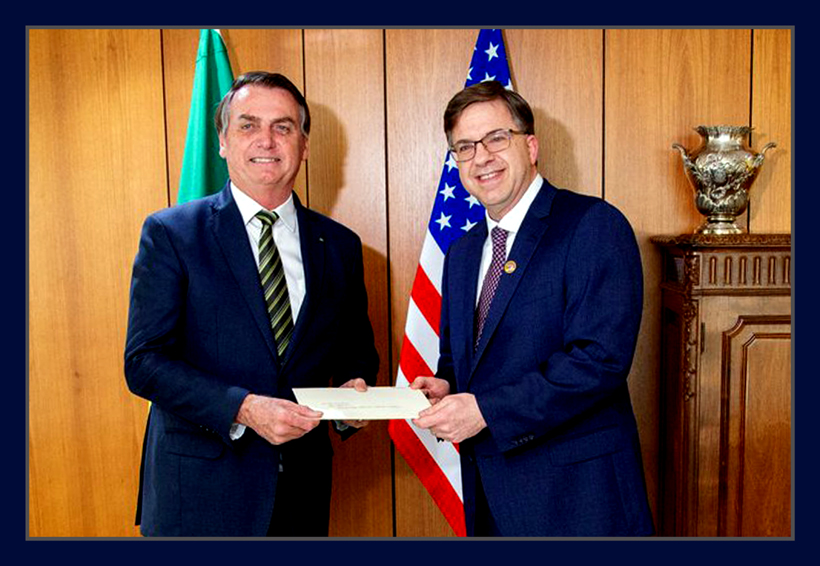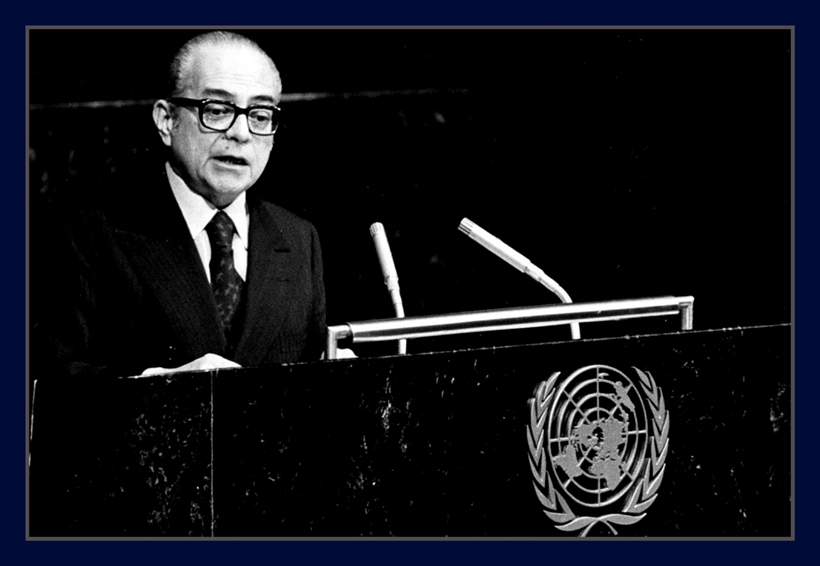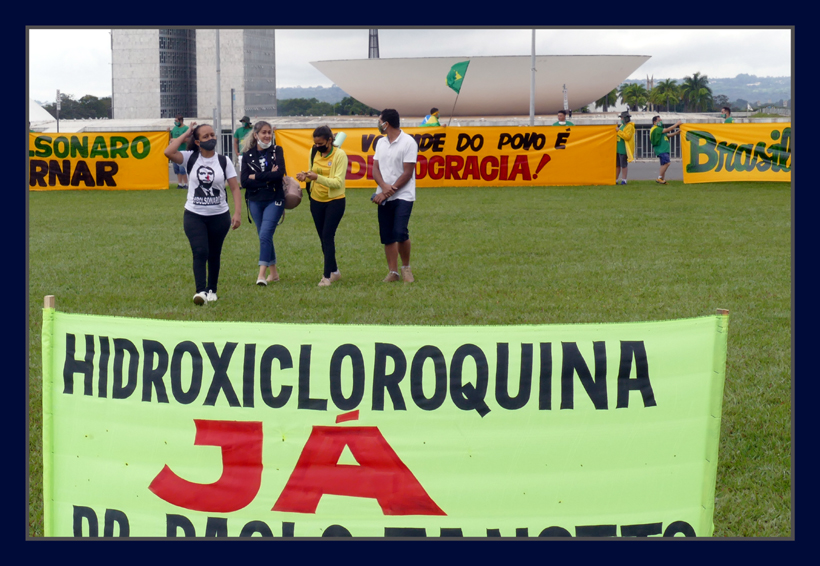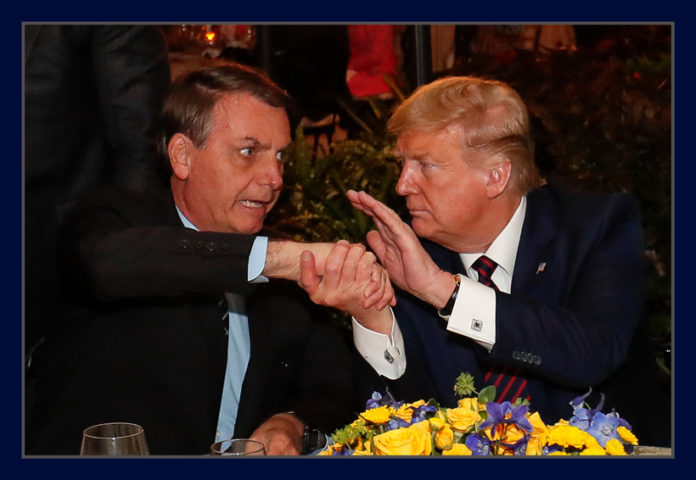America grows more divided amid coronavirus crisis, as a distracted Trump sows discord
More than 40 million Americans have filed claims for jobless benefits in the past 10 weeks, including 2.1 million new claims last week, according to Labor Department data released this morning.
The novel coronavirus has now killed more than 100,000 people in the United States, and fresh polling from the nonpartisan Kaiser Family Foundation illustrates the cascading societal fallout of the contagion: 48 percent of U.S. adults say they or someone in their household have postponed or skipped medical care; 39 percent say worry or stress related to the virus has had a negative impact on their mental health; 31 percent say they have fallen behind in paying bills or had problems affording household expenses like food or health insurance coverage; and 26 percent say they or someone in their household have skipped meals or relied on charity or government food programs since February.
Another survey released last week showed that 14 percent of Americans say they know someone who has succumbed to the virus. “It’s as if every person in Edison, N.J., or Kenosha, Wis., died. It’s half the population of Salt Lake City or Grand Rapids, Mich. It’s about 20 times the number of people killed in homicides in that length of time, about twice the number who die of strokes,” Marc Fisher observes on the front page of our newspaper today. “There has been as yet no national requiem, no moment that captured the collective sense of loss, no president standing atop the ruins, rallying the nation through a bullhorn. …
“Denial has always been part of how people cope with death, and the early spread of the virus was accompanied by [President] Trump’s persistent assurances that the coronavirus wouldn’t amount to much. As late as mid-April, he said that the country’s coronavirus deaths would end up ‘substantially below the 100,000’ level, maybe as little as half that number. More recently, he has questioned the death tallies. … Most health officials agree that 100,000 is likely an undercount.”
Trump tweeted this morning to acknowledge the grim milestone, but his public schedule this week contains no special commemoration, no moment of silence and no collective sharing of grief. “The president has fashioned himself as the nation’s cheerleader, without also taking on the traditional leadership role of consoler in chief,” Ashley Parker reports.
Dartmouth religion professor Randall Balmer contrasts Trump’s handling of such a staggering loss of life to Franklin Roosevelt on D-Day in 1944, Bill Clinton after the Oklahoma City bombing in 1995, George W. Bush after the 9/11 attacks in 2001 and Barack Obama after the Sandy Hook school shooting in 2012. “Where is the expression of sorrow that we all feel? No one is articulating that for the nation,” said Balmer, who was written for decades about American religion and the presidency. “Other presidents have simply understood that as part of their job. … For it to work, you’d have to draw on some internal reservoir of, if not piety, at least empathy. I’m not trying to be political, but I just don’t see it in the current president.”
Instead, Trump is poised to sign an executive order today that could roll back the immunity that tech giants have for the content on their sites. “Trump’s directive chiefly seeks to embolden federal regulators to rethink a portion of law known as Section 230,” per Tony Romm and Josh Dawsey. “The order would also seek to channel complaints about political bias to the Federal Trade Commission, which would be encouraged to probe whether tech companies’ content-moderation policies are in keeping with their pledges of neutrality. It would also require federal agencies to review their spending on social media advertising … The wide-ranging order comes two days after Twitter took the rare step of labeling one of the president’s tweets and linking viewers to news articles that fact-checked his claims. The move infuriatedTrump.”
This will save no lives and create no jobs, although perhaps it will generate more billable hours for white-shoe law firms with First Amendment practices. Why does Trump care so much about not being filtered on social media? Our Fact Checker team analyzed thousands of Facebook, Twitter and YouTube posts and ads from Trump, his campaign and its surrogates. Doing so paints a picture of the alternative reality that the president’s reelection effort is trying to create for low-information voters who don’t follow traditional news organizations.
“The data revealed the backbone of a five-point strategy to tell their version of the coronavirus story: rewriting mistakes, highlighting achievements, deflecting blame, declaring victory and creating distraction,” Meg Kelly and Elyse Samuels write this morning. “All presidential campaigns try to portray their candidate in the best possible light, but what is notable about the Trump campaign is that its social media reach allows the campaign to rewrite even the most recent history.”
With no evidence, Trump has suggested five times – this month alone – that individuals and entities may have committed treason against the United States. Over the past three years, JM Rieger notes, the president has accused the following people of committing a crime punishable by death that fewer than 30 people have been prosecuted for in American history: congressional Democrats, the news media, the Justice Department under Obama, Lisa Page, Jim Comey, Andy McCabe, Adam Schiff, the anonymous author of an op-ed and the attorney for the intelligence community official who blew the whistle on his Ukraine call.
Attorney General Bill Barr, who career prosecutors say has politicized the Justice Department for Trump’s benefit, continues his push to investigate the president’s investigators.The latest news is that Barr has deputized John Bash, the Trump-appointed U.S. attorney for the Western District of Texas, to review “unmasking” requests made by Obama administration officials. This is an offshoot of the investigation that’s underway by John Durham, the U.S. attorney for Connecticut, into the origins of the 2016 probe into Russian election interference, per Devlin Barrett.
Meanwhile, another Trump tweet plunged Congress into chaos – and thwarted the renewal of vital authorities needed by law enforcement to keep tabs on potential spies and terrorists. An effort to pass a significant surveillance overhaul package collapsed in the 9 p.m. hour on Wednesday after the president unexpectedly urged Republicans to vote no, via Twitter of course, thereby fracturing a fragile coalition. The underlying law, called the USA Freedom Act, expired on March 15. The House had previously voted to reauthorize it, but the Senate amended the House version earlier this month to add civil liberties protections. House Democratic leaders abandoned the scheduled vote a few hours after Trump issued a veto threat on Twitter.
“They have not determined when — or whether — the legislation might be revived,” Ellen Nakashima and Mike DeBonis report. “The pulling of the bill to reauthorize a number of national security powers under the Foreign Intelligence Surveillance Act came a day after the president tweeted his disfavor, ostensibly on grounds that it fails to address what he calls ‘the greatest political, criminal, and subversive scandal in USA history.’ While he has never explicitly spelled out what he means, Trump has blasted the FBI for its flawed surveillance of a former campaign aide, Carter Page, and accused the government without evidence of spying on Trump Tower during the campaign. None of the now-expired authorities the bill sought to revive were at issue in Page’s surveillance.”
Earlier in the day, House lawmakers cast the first remote congressional floor votes in history –over noisy objections from GOP leaders, who filed a federal lawsuit that calls proxy voting unconstitutional. “The new system of voting by proxy was pushed forward by House Speaker Nancy Pelosi (D-Calif.) and fellow Democratic leaders this month as a temporary measure,” DeBonis reports. “The House passed the resolution — calling for sanctions against Chinese officials for harsh treatment of the Uighur ethnic minority in the Xinjiang region — on a 413-to-1 vote, with 69 yes votes cast by proxy. Republican leaders criticized the change as a breach of 231 years of House custom …
“The clause in Article I of the Constitution that mandates a majority quorum for the House to do business, they said, implies that such a majority must be present in Washington. Multiple legal scholars told the Rules Committee last month that the proxy voting system passed constitutional muster, noting that courts have long been reluctant to challenge the legislative branch’s ability to set its own rules. Those precedents are rooted in a pair of 1892 Supreme Court decisions, in Field v. Clark and United States v. Ballin, in which the court declined to overturn federal laws that were passed under new methods of determining a House quorum.”
At a news conference in which he accused Democrats of dereliction of duty, House Minority Leader Kevin McCarthy (R-Calif.) refused to speak out against Trump’s baseless conspiracy theory about former GOP congressman Joe Scarborough, whom the president has linked to the death of a staff member. “I was not here with Joe Scarborough. I don’t quite know about the subject itself,” said McCarthy, ducking when asked whether he agreed with the Wall Street Journal editorial that said Trump was “debasing his office” with claims that have caused more pain for an innocent family, including the woman’s widower.
Trump has also, almost single-handedly, transformed the simple act of wearing a facial covering into the latest battle in the culture wars, dividing his own party in the process. Overnight, the president again mocked his Democratic challenger for complying with guidelines released by public health officials in his own government:
Some businesses around the country are now kicking outcustomers who wear face masks. A Kentucky gas station and a Los Angeles flooring store are among the businesses that are banning mask-wearers. “If we’re only allowed to be at 25 percent capacity, I want them to be 25 percent of people that aren’t p-----, that aren’t sheep,” Kevin Smith, the owner of Liberty Tree Tavern in Elgin, Tex., told Teo Armus. “Being scared all the time isn’t good for your health. It suppresses your immune system.”
| |||||||||||||||
Quote of the day
Civil unrest is a real danger. A second night of protests over the death of George Floyd turned deadly.
The protests “turned chaotic as police fired rubber bullets from a rooftop,” Holly Bailey, Brittany Shammas and Kim Bellware report. “A peaceful protest earlier in the evening descended into disarray and looting. A group of officers stood in front of a nearby precinct and tried to disrupt the crowd with flash bang grenades and rubber bullets. At times, the tear gas was so thick, it wafted down neighborhood streets where people standing in their front yards were coughing and wiping at their eyes. … One person was shot by a pawn shop owner and died at a hospital, police told the Star Tribune, as looters ransacked a Target, Foot Locker and nearby small businesses. Mayor Jacob Frey (D) requested help from the state’s National Guard as local leaders pleaded for a peaceful resolution. … The scene followed the death of 46-year-old George Floyd on Monday …
"In the suburb of Oakdale, hundreds of protesters on Wednesday gathered outside the home of Derek Chauvin, the police officer who was captured on the video with his knee on Floyd’s neck. According to the Star Tribune, red paint was poured onto Chauvin’s driveway, and the word ‘killer’ was written on the garage door. … As demands for accountability rang out from Floyd’s family, politicians on both sides of the aisle, celebrities and other high-profile figures, [the mayor] called on the county prosecutor to arrest [Chauvin]. … Yet with several high-profile, fatal police encounters in recent years — along with efforts at reform — some activists couldn’t help but feel hopeless. … Benjamin Crump, an attorney for the Floyd family, said that without public pressure, he feared authorities would try to sweep the incident under the rug. But he said that with the video, ‘you can’t deny truth that you witness with your own eyes.’”
Police chiefs around the nation responded with disgust to the news of Floyd’s death, seeking to reassure their cities. Police executives, including the heads of the International Association of Chiefs of Police, the Major Cities Chiefs Association and the National Police Foundation, as well as police chiefs in Miami, Houston and Los Angeles denounced the officer's actions. (Tom Jackman)
Floyd’s death sparked protests in at least three other major cities. In Los Angeles, protesters blocked the 101 freeway and clashed with officers, leaving at least one demonstrator injured, per the Los Angeles Times. In Chicago, protesters led by Chance the Rapper peacefully organized outside the city's public safety headquarters. “I’m sure there’s some black men and women officers, and white officers in this building that woke up sick to their stomach when they saw this video as well, and we’re standing in solidarity with all those people, and we’re just letting you all know that this s---’s not going to keep happening,” the singer said, according to CBS Chicago. And in Memphis, a silent demonstration turned into separate verbal confrontations between protesters, police and counterprotesters, the Memphis Commercial Appeal reported.
The University of Minnesota announced that it will reduce ties with the Minneapolis Police Department. “University President Joan Gabel said in a letter to the university community that the school would no longer contract with the police department to provide additional law enforcement support for football games, concerts and other large events, or for specialized services — such as K-9 explosive-detection units — at university events,” per Valerie Strauss.
Joe Biden called for a federal civil rights investigation into Floyd’s death. Biden commended the Minneapolis Police Department’s swift firing of Chauvin but said more needs to be done. “They have to be held more fully accountable,” he said. (Sean Sullivan)
Trump tweeted last night that he asked the FBI to expedite its investigation. “My heart goes out to George’s family and friends,” he tweeted. “Justice will be served!”
Flashback to July 2017: “Trump tells police not to worry about injuring suspects during arrests.”
| |||||||||||||||
Temas de relações internacionais, de política externa e de diplomacia brasileira, com ênfase em políticas econômicas, em viagens, livros e cultura em geral. Um quilombo de resistência intelectual em defesa da racionalidade, da inteligência e das liberdades democráticas.
O que é este blog?
Este blog trata basicamente de ideias, se possível inteligentes, para pessoas inteligentes. Ele também se ocupa de ideias aplicadas à política, em especial à política econômica. Ele constitui uma tentativa de manter um pensamento crítico e independente sobre livros, sobre questões culturais em geral, focando numa discussão bem informada sobre temas de relações internacionais e de política externa do Brasil. Para meus livros e ensaios ver o website: www.pralmeida.org. Para a maior parte de meus textos, ver minha página na plataforma Academia.edu, link: https://itamaraty.academia.edu/PauloRobertodeAlmeida;
Meu Twitter: https://twitter.com/PauloAlmeida53
Facebook: https://www.facebook.com/paulobooks
quinta-feira, 28 de maio de 2020
America grows more divided amid coronavirus crisis, as a distracted Trump sows discord - James Hohmann (WP)
quinta-feira, 21 de maio de 2020
Trump surfa no puxa-saquismo de Bolsonaro para tirar sarro do Brasil - Andrei Meireles (Os Divergentes)
Trump surfa no puxa-saquismo de Bolsonaro para tirar sarro do Brasil



sábado, 28 de março de 2020
Ian Bremmer: Perto de Bolsonaro, Trump parece o Churchill, diz CEO da Eurasia (Veja)
Perto de Bolsonaro, Trump parece o Churchill, diz CEO da Eurasia
Em entrevista a VEJA, Ian Bremmer diz que o 'lockdown' é fundamental
para salvar a economia e que o mundo sairá da crise mais desglobalizado
Globalmente falando, Bolsonaro está sozinho nesta equação e está apostando perigosamente cedo na preocupação majoritária com a economia em detrimento da saúde das pessoas que movem essa economia
O erro de cálculo do presidente Jair Bolsonaro pode levar a uma queda no seu apoio popular, o que o fará dobrar a aposta na polarização política
quarta-feira, 25 de março de 2020
A introversão do império sob Trump - Nicholas Burns (Foreign Affairs)
|
|
|
segunda-feira, 2 de março de 2020
Roubini on Coronavirus: Global Disaster - Tim Bartz (Der Spiegel)
Paulo Roberto de Almeida

